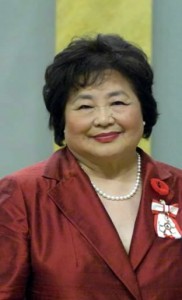Kiyoshi Tanimoto Peace Prize awarded to Setsuko Thurlow, the first recipient among A-bomb survivors residing overseas
Sep. 22, 2014
by Michiko Tanaka, Staff Writer
On September 17, the Hiroshima Peace Center Foundation, located in Saeki Ward, Hiroshima and chaired by Mamoru Tsuru, announced that Setsuko Thurlow, 82, an A-bomb survivor and resident of Toronto, Canada, has been selected as the recipient of the 26th Kiyoshi Tanimoto Peace Prize. The foundation has recognized Ms. Thurlow’s achievements in long sharing the account of her A-bomb experience to convey the horror of the atomic bombing to the world.
Ms. Thurlow was born in Minami Ward, Hiroshima. At the age of 13, as a mobilized student, she experienced the bombing while at the Headquarters of the Second General Army, located in Futabanosato (part of present-day Higashi Ward). After graduating from college in the United States, she began engaging in peace activities there. After getting married, she moved to Canada and then continued to actively speak out about her experience, in and out of Japan.
Responding to news of the award, Ms. Thurlow commented that, as part of the antiwar and antinuclear movement, alongside much-admired elder members, she feels delighted at this acknowledgment of her work. She also expressed determination to redouble her peace efforts. She is expected to attend the award ceremony on November 16 in Hiroshima.
The Kiyoshi Tanimoto Peace Prize was established in 1987 to carry on the spirit of the late minister Kiyoshi Tanimoto of Hiroshima Nagarekawa Church in Naka Ward, who devoted himself to providing support for A-bomb survivors. The prize is awarded to individuals and groups that pursue activities intended to promote peace in the world. Ms. Thurlow is the first recipient of the award among A-bomb survivors who reside outside of Japan. Commenting on Ms. Thurlow’s achievements, Mr. Tsuru said, “She is a valuable person who can speak about the atomic bombing in English. It is extraordinary that she has continued to appeal for the abolition of nuclear weapons for over half a century while living overseas.”
(Originally published on September 18, 2014)
On September 17, the Hiroshima Peace Center Foundation, located in Saeki Ward, Hiroshima and chaired by Mamoru Tsuru, announced that Setsuko Thurlow, 82, an A-bomb survivor and resident of Toronto, Canada, has been selected as the recipient of the 26th Kiyoshi Tanimoto Peace Prize. The foundation has recognized Ms. Thurlow’s achievements in long sharing the account of her A-bomb experience to convey the horror of the atomic bombing to the world.
Ms. Thurlow was born in Minami Ward, Hiroshima. At the age of 13, as a mobilized student, she experienced the bombing while at the Headquarters of the Second General Army, located in Futabanosato (part of present-day Higashi Ward). After graduating from college in the United States, she began engaging in peace activities there. After getting married, she moved to Canada and then continued to actively speak out about her experience, in and out of Japan.
Responding to news of the award, Ms. Thurlow commented that, as part of the antiwar and antinuclear movement, alongside much-admired elder members, she feels delighted at this acknowledgment of her work. She also expressed determination to redouble her peace efforts. She is expected to attend the award ceremony on November 16 in Hiroshima.
The Kiyoshi Tanimoto Peace Prize was established in 1987 to carry on the spirit of the late minister Kiyoshi Tanimoto of Hiroshima Nagarekawa Church in Naka Ward, who devoted himself to providing support for A-bomb survivors. The prize is awarded to individuals and groups that pursue activities intended to promote peace in the world. Ms. Thurlow is the first recipient of the award among A-bomb survivors who reside outside of Japan. Commenting on Ms. Thurlow’s achievements, Mr. Tsuru said, “She is a valuable person who can speak about the atomic bombing in English. It is extraordinary that she has continued to appeal for the abolition of nuclear weapons for over half a century while living overseas.”
(Originally published on September 18, 2014)







